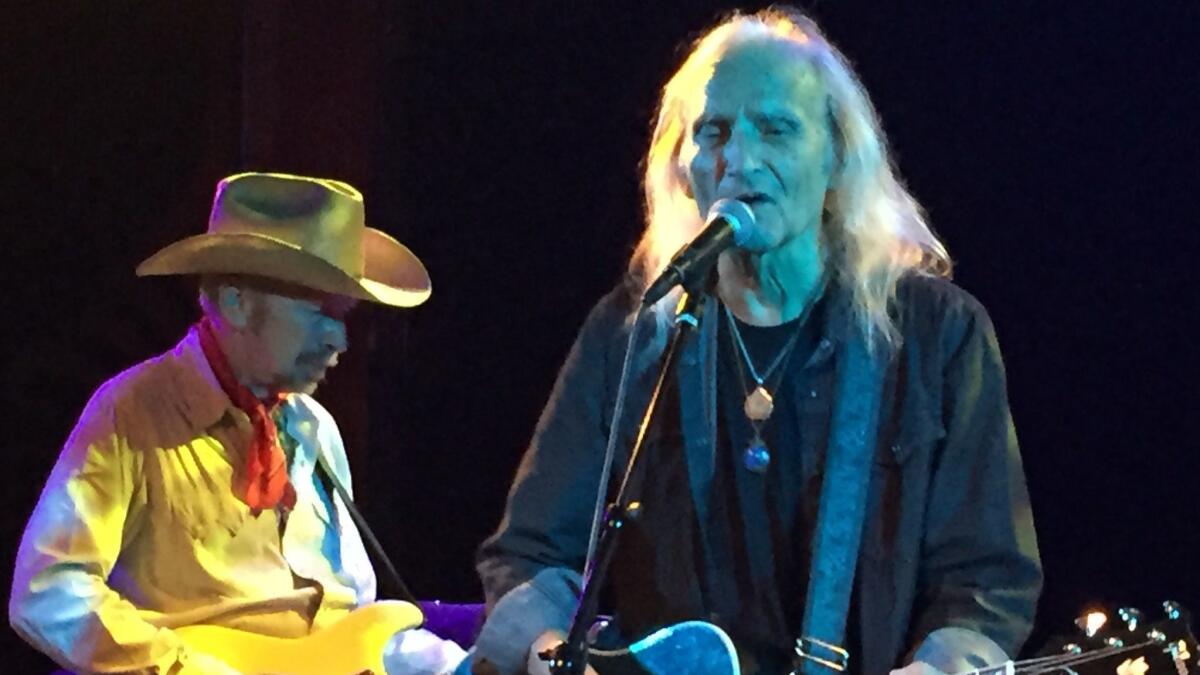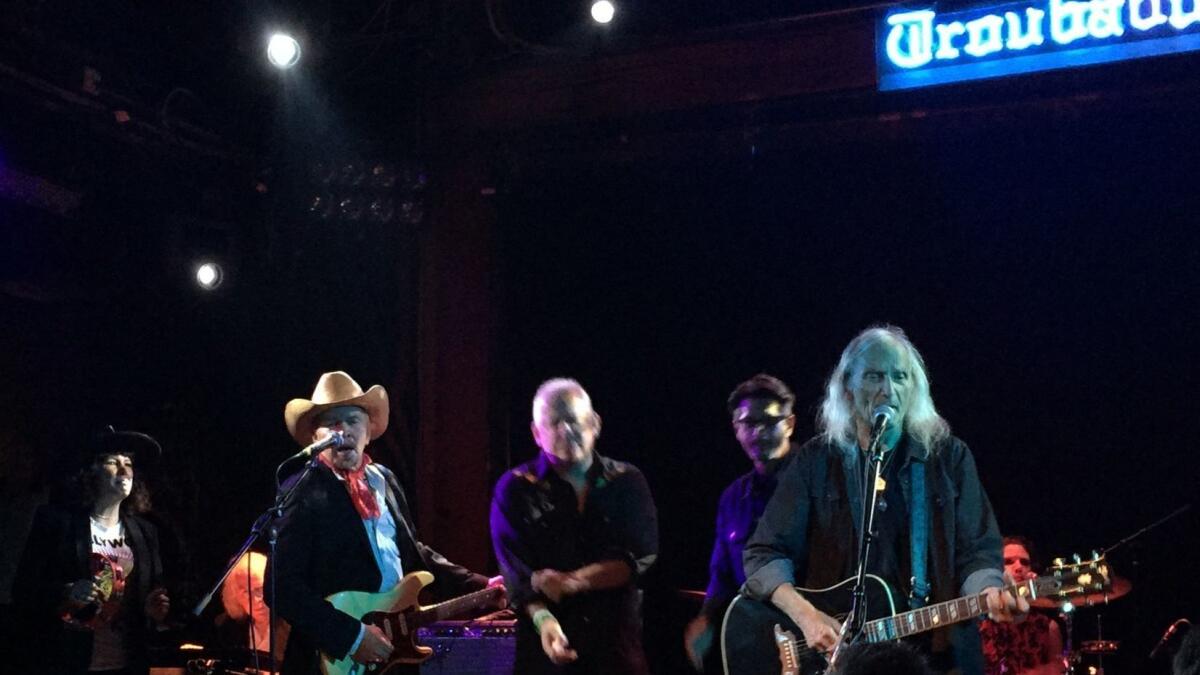Review: Americana vets Dave Alvin, Jimmie Dale Gilmore swap songs and stories at the Troubadour

- Share via
It was hard to imagine a more unlikely scenario than the one that played out at the end of Dave Alvin and Jimmie Dale Gilmore’s duo show Thursday at the Troubadour, a hometown stop — for Alvin anyway — on the esteemed singer-songwriters’ tour built around their collaborative album “Downey to Lubbock.”
There was Gilmore, 73, long revered for his Zen-like presence and the literary-philosophical-spiritual bent he has brought to the world of Americana music from well before the term was common parlance, pounding away on his Gibson acoustic guitar and wailing harmonies into his microphone as Alvin, 62, tore stinging guitar licks from his Fender Stratocaster and belted out his lead vocal on the closing number, the Blasters’ neo-rockabilly-turned-zydeco standard “Marie Marie.”
As rewarding as the album is, it would hardly prepare anyone for the symbiotic relationship they projected from the stage, seamlessly swapping songs as well as illuminating between-song stories, often exchanging anecdotes the way jazz musicians trade fours.
The evening showed them to be an unexpected example of the notion of twin brothers from another mother: Alvin, the roots-rock loving guitarist and songwriter from Downey, Gilmore, probably best known for his role in West Texas outlaw country trio the Flatlanders and the ethereal voice of folk-country songs that often explore life’s other side.
Yet their commonalities easily transcend their differences. As Alvin put it in the album’s liner notes, “Jimmie and I may have grown up a decade apart, with a thousand miles between us, but oddly enough, we grew up listening to, loving and being inspired by the same music.”
Indeed, at the core, both are deeply versed in American blues, folk, country and rock music at its purest, a shared musical vocabulary that is expressed eloquently in the songs they chose for “Downey to Lubbock,” and which they expanded on in Thursday’s nearly two-hour performance.
The pair were backed by Alvin’s Guilty Ones four-piece band, who were ably supplemented toward the end by guest appearances from L.A.-based Dead Rock West’s Frank Lee Drennen and Cindy Wasserman plus the night’s opening act, Jon Langford’s Lost Souls.
They opened with the album’s title track, an autobiographical original they wrote together in recognition of their differences and celebration of their similarities.
“I got a loud Stratocaster that can blow any roadhouse down/You know I’ve been up to the mountain and I’ve looked for the promised land, I’ve been to the Ash Grove and shook Lightnin’s hand,” Alvin sang in the first verse in his road-worn tobacco-stained baritone. Gilmore then answered in his quavering otherworldly tenor, “I’m an old flatlander from the great high plains, I like wanderlust and wonder, West Texas wind blows through my veins.”

A bit later, Alvin noted that they had, unknowingly at the time in the ’60s, attended some of the same shows at the venerated Ash Grove folk club in Hollywood. Their parallel paths crystallized beautifully in the shaggy dog intro to one of the songs on the album, “SIlverlake,” by Texas songwriter Steve Young, among the many musicians both long admired from their distant vantage points. Gilmore started the tale, explaining that nearly 30 years ago Young told him he had a song he wanted Gilmore to record.
Alvin then pointed out that while listening to Gilmore tell that story on a show they previously shared, he realized Young had pitched him in virtually the same way, with the same song, during a time they both lived in L.A. in the Silver Lake/Echo Park neighborhood.
“Steve transformed into this transcendental, philosophical, spiritual, mystical guy,” Alvin said, “but apparently he was also still a bit of a hustler.”
The camaraderie between the two was palpable, and the joy on Gilmore’s face at being able to tear things up a bit more than he typically has on his own, or even with fellow Flatlanders Joe Ely and Butch Hancock, was infectious.
They also served up two socially minded songs by other writers they included on the album, Chet Powers’ (a.k.a. Dino Valenti) “Get Together” that was a hit for the Youngbloods in 1969, and Woody Guthrie’s “Deportee (Plane Wreck at Los Gatos),” the latter being introduced by Alvin as “timeless and, unfortunately, timely.”
They toyed with the melody from Guthrie’s version, Gilmore’s haunting lead vocal bringing more anguish to the story of migrant farm workers killed in a plane crash, people who were dismissed in the news coverage of the real-life tragedy as “just deportees.” Guthrie gave them names in his poignant ode: “Goodbye to my Juan, goodbye Rosalita/‘Adios,’ mis amigos, Jesus y Maria/You won’t have a name when you ride the big airplane/All they will call you will be, ‘deportee.’”
They also reached beyond the album’s dozen songs for a few cornerstone numbers from their respective catalogs, Alvin offering his “Fourth of July,” which X quickly adopted when Alvin joined their camp, and the set-closing “Marie Marie,” Gilmore delivering “Tonight I Think I’m Gonna Go Downtown” and “Dallas.”
There were facets of their teaming that might have appeared to make for a musical odd couple. But after seeing the real-world result at the Troubadour, long may they run.
Follow @RandyLewis2 on Twitter.com
For Classic Rock coverage, join us on Facebook
More to Read
The biggest entertainment stories
Get our big stories about Hollywood, film, television, music, arts, culture and more right in your inbox as soon as they publish.
You may occasionally receive promotional content from the Los Angeles Times.










